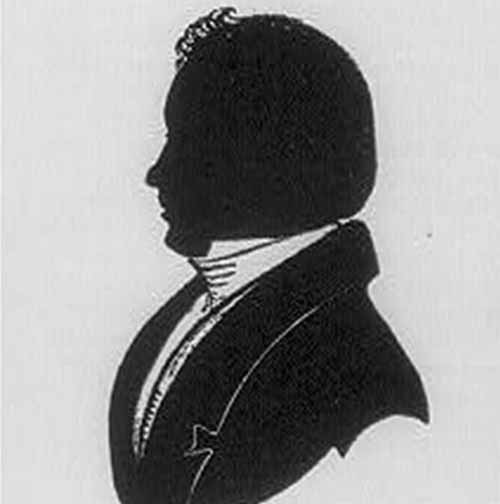Nov. 7, 1837: Journalist and slavery opponent Elijah Parish Lovejoy, 34, an Albion native who graduated at the top of his class from what is now Colby College in Waterville, is shot to death in Alton, Illinois, by a mob that has come to destroy his printing press.

Lovejoy started his career in education, becoming principal of China Academy in Maine, which he had attended as a student. He moved to St. Louis, where he became editor of the First Presbyterian Church’s weekly newspaper, the St. Louis Observer.
Church officials soon told Lovejoy to stop writing about slavery. He refused. When in the spring of 1836 he condemned the public lynching of a free Negro and the acquittal of the killers, thugs came at night and destroyed his press. He moved across the river to Alton, in the free state of Illinois, but he encountered the same violent resistance. His first press there was pushed into the river before it could be delivered. Locals said his anti-slavery harangues were hurting the cotton shipping business, and they begged him to stop.
“If I have been guilty of no violation of law, why am I hunted up and down continually like a partridge in the mountains?” he wrote.
A month after he printed a July Fourth screed inviting people to form a chapter of the American Anti-Slavery Society, his print shop was wrecked again. When a replacement press arrived and was installed, a drunken mob began hurling stones at Lovejoy’s print shop and set the roof on fire. Lovejoy stepped outside and was fatally wounded by three musket balls.
In 1952, Colby College establishes the Elijah Parish Lovejoy Award to honor journalists who sacrifice their lives “to shed light on some of the most important issues of our times.” The award is presented annually.

Gerald Talbot, left, stands on Market Street with other Mainers who took part in the March on Washington on Aug 28, 1963. Left to right: Gerald Talbot, Alfred Burris, Lawrence Graham, Reverend Valton V. Morse, Elizabeth Aldrich, Mrs. Joseph Robey, Reverend John C. Bruce. Press Herald photo courtesy Portland Public Library Special Collections and Archives
Nov. 7, 1972: Newspaper compositor and civil rights advocate Gerald Talbot, a Democrat from Portland, wins election as the first Black member of the Maine House of Representatives.
Talbot, a Bangor native, attended the 1963 March on Washington and heard the Rev. Martin Luther King Jr. deliver his “I Have a Dream” speech. Gov. Kenneth Curtis appointed him to a state Human Rights Task Force in 1968. He also was the first president of Portland’s NAACP chapter.
Talbot’s House victory occurs in the same election in which President Richard Nixon, a Republican, wins re-election in a landslide that gives him majorities in 49 states, including Maine; and in which four-term U.S. Sen. Margaret Chase Smith, R-Maine, loses her bid for re-election to Democrat William Hathaway.
During his three two-year House terms, Talbot champions migrant worker rights, Indian tribal sovereignty, fair housing and creating a holiday to honor King.
On Sept. 10, 2019, the University of Southern Maine honors Talbot by creating a teaching fellowship bearing his name. The accompanying ceremony occurs on USM’s Portland campus in the Glickman Library, the same place where Talbot worked as a janitor years earlier when it was an industrial building.
Nov. 7, 1973: Augusta’s Fort Western, built in 1754 at the start of the French and Indian War, is designated a national historic landmark.
Col. Benedict Arnold’s men stopped at the fort in 1775 during their ill-fated expedition to attack Quebec at the start of the American Revolution.
The fort is now the oldest log fort in the United States and a well-preserved example of an 18th-century trading post. It is owned by the city of Augusta and operated as a museum during the warmer months.
Nov. 7, 2000: Maine voters narrowly reject a proposed “death with dignity” law.
The referendum question states: “Should a terminally ill adult who is of sound mind be allowed to ask for and receive a doctor’s help to die?”
In June 2019, however, the electorate changes its mind, and Maine becomes the eighth U.S. state to legalize assisted suicide.
Joseph Owen is an author, retired newspaper editor and board member of the Kennebec Historical Society. Owen’s book, “This Day in Maine,” can be ordered at islandportpress.com. To get a signed copy use promo code signedbyjoe at checkout. Joe can be contacted at: jowen@mainetoday.com.
Copy the Story LinkSend questions/comments to the editors.



Success. Please wait for the page to reload. If the page does not reload within 5 seconds, please refresh the page.
Enter your email and password to access comments.
Hi, to comment on stories you must . This profile is in addition to your subscription and website login.
Already have a commenting profile? .
Invalid username/password.
Please check your email to confirm and complete your registration.
Only subscribers are eligible to post comments. Please subscribe or login first for digital access. Here’s why.
Use the form below to reset your password. When you've submitted your account email, we will send an email with a reset code.